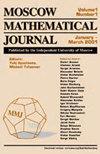单位雅可比矩阵解析映射的参数化与反演
IF 0.5
4区 数学
Q3 MATHEMATICS
引用次数: 0
摘要
设$x=(x_1,\ldots,x_n)\in{\rm\bf C}^n$是复变量的向量,用$a=(a_{jk}我们研究了映射族$$f=(f_1,\ldots,f_n):{\rm\bf C}^n\rightarrow{\rm \bf C}^n,\quad f[A,\varphi](x):=x+\varphi_{jk}x_k\右),\quad j=1,\ldots,n$$,其Jacobian与任何$x$的非零常数相同,使得所有$f_j$都是明确定义的。设$U$是一个平方矩阵,使得映射$f[U,\varphi](x)$的雅可比矩阵对于任何$x$以及对于任何分析函数$\varphi\in\mathcal{O}(\Omega)都是非零常数。$我们证明了任何这样的矩阵$U$都是唯一定义的,直到矩阵的适当置换相似性,通过将维数$n$划分为$m$正整数的和以及$m$元素上的置换。对于任何$d=2,3,\ldots$,我们构造了$n$-平方矩阵的参数族$H(s),s\in{\rm\bf C}^n$,使得对于上面的任何矩阵$U$,由Hadamard乘积$U\odot H(s。我们证明了任何这样的映射是多项式可逆的,并为其逆提供了一个显式递归公式。本文章由计算机程序翻译,如有差异,请以英文原文为准。
Parameterizing and Inverting Analytic Mappings with Unit Jacobian
Let $x=(x_1,\ldots,x_n)\in {\rm \bf C}^n$ be a vector of complex variables, denote by $A=(a_{jk})$ a square matrix of size $n\geq 2,$ and let $\varphi\in\mathcal{O}(\Omega)$ be an analytic function defined in a nonempty domain $\Omega\subset {\rm \bf C}.$ We investigate the family of mappings $$ f=(f_1,\ldots,f_n):{\rm \bf C}^n\rightarrow {\rm \bf C}^n, \quad f[A,\varphi](x):=x+\varphi(Ax) $$ with the coordinates $$ f_j : x \mapsto x_j + \varphi\left(\sum\limits_{k=1}^n a_{jk}x_k\right), \quad j=1,\ldots,n $$ whose Jacobian is identically equal to a nonzero constant for any $x$ such that all of $f_j$ are well-defined. Let $U$ be a square matrix such that the Jacobian of the mapping $f[U,\varphi](x)$ is a nonzero constant for any $x$ and moreover for any analytic function $\varphi\in\mathcal{O}(\Omega).$ We show that any such matrix $U$ is uniquely defined, up to a suitable permutation similarity of matrices, by a partition of the dimension $n$ into a sum of $m$ positive integers together with a permutation on $m$ elements. For any $d=2,3,\ldots$ we construct $n$-parametric family of square matrices $H(s), s\in {\rm \bf C}^n$ such that for any matrix $U$ as above the mapping $x+\left((U\odot H(s))x\right)^d$ defined by the Hadamard product $U\odot H(s)$ has unit Jacobian. We prove any such mapping to be polynomially invertible and provide an explicit recursive formula for its inverse.
求助全文
通过发布文献求助,成功后即可免费获取论文全文。
去求助
来源期刊
CiteScore
1.40
自引率
0.00%
发文量
16
审稿时长
>12 weeks
期刊介绍:
The Moscow Mathematical Journal (MMJ) is an international quarterly published (paper and electronic) by the Independent University of Moscow and the department of mathematics of the Higher School of Economics, and distributed by the American Mathematical Society. MMJ presents highest quality research and research-expository papers in mathematics from all over the world. Its purpose is to bring together different branches of our science and to achieve the broadest possible outlook on mathematics, characteristic of the Moscow mathematical school in general and of the Independent University of Moscow in particular.
An important specific trait of the journal is that it especially encourages research-expository papers, which must contain new important results and include detailed introductions, placing the achievements in the context of other studies and explaining the motivation behind the research. The aim is to make the articles — at least the formulation of the main results and their significance — understandable to a wide mathematical audience rather than to a narrow class of specialists.

 求助内容:
求助内容: 应助结果提醒方式:
应助结果提醒方式:


